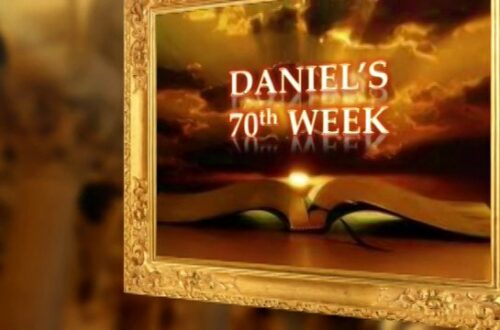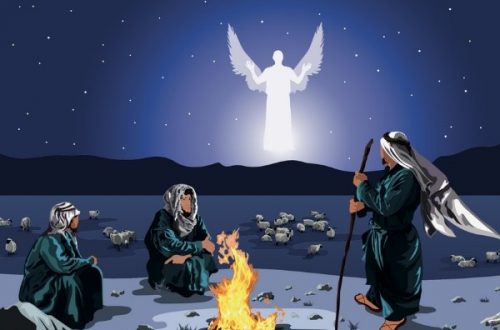A Christian Conservative Goes to College, part 15 (World Religions Class: Obfuscating the Old Testament)
“For those who guide this people are leading them astray; And those who are guided by them are brought to confusion” (Isaiah 9:16, NASB).
It was verbal professorial blitzkrieg. Seven weeks of World Religions Class with a textbook that listed seven major world religions, but the professors had spent at least four weeks trying to dismantle the Bible, the God of the Bible (i.e. the only true God), and Christianity. They attacked and attempted to undermine from every angle, appealing to feelings, to subjectivity, to modern “understanding”, etc. They questioned everything, led the witnesses, and sat as judge and jury. They prosecuted, but never defended.
And I was still stunned and overwhelmed. I was not yet prepared or ready to jump into the debate. I saw how the professors played the game. I saw how they took cheap shots in jest, then dodged, got serious, moved in and out of the subject matter, asked questions out of left field, etc. I was like a child watching and timing their verbal game of jump rope, trying to get the timing right in order to jump in. Yet I was fully aware that I am a much better communicator and debater on paper, than with the spoken word. The time had not yet come, but it would.
“For those who guide this people are leading them astray; And those who are guided by them are brought to confusion” (Isaiah 9:16, NASB).
It was verbal professorial blitzkrieg. Seven weeks of World Religions Class with a textbook that listed seven major world religions, but the professors had spent at least four weeks trying to dismantle the Bible, the God of the Bible (i.e. the only true God), and Christianity. They attacked and attempted to undermine from every angle, appealing to feelings, to subjectivity, to modern “understanding”, etc. They questioned everything, led the witnesses, and sat as judge and jury. They prosecuted, but never defended.
And I was still stunned and overwhelmed. I was not yet prepared or ready to jump into the debate. I saw how the professors played the game. I saw how they took cheap shots in jest, then dodged, got serious, moved in and out of the subject matter, asked questions out of left field, etc. I was like a child watching and timing their verbal game of jump rope, trying to get the timing right in order to jump in. Yet I was fully aware that I am a much better communicator and debater on paper, than with the spoken word. The time had not yet come, but it would.
On the heels of using a philosophically bankrupt theory, the Documentary Hypothesis, to deconstruct the Genesis creation accounts, the professor next tried to invent contradictions in the account of the Noah and the Flood.
“Fools have no interest in understanding; they only want to air their own opinions” (Proverbs 18:2, NLT).
The class handout asked, “How many of each animal did Noah take on the ark?” Two verses were provided to read: Genesis 6:19: “You must bring into the ark two of every kind of living creature from all flesh, male and female, to keep them alive” and Genesis 7:2: “You must take with you seven of every kind of clean animal, the male and its mate, two of every kind of unclean animal, the male and its mate…” The professor then affirmed confidently, “These are contradictions.” Where? How? As in the Genesis 1 and 2 creation accounts, more detail and depth are offered in the latter passage. This is like reading, “We all took peanut butter sandwiches for lunch” and later reading, “Iris, because she was allergic to peanuts, took a chicken salad sandwich.” It’s an added detail. Would the professor then bring forth the skeptic scholars’ “peanut butter hypothesis” and call contradictory? Of course not. But he had entered the realm of intentional deception.
His next question was “How many days did the flood last?” He wanted us to find a discrepancy between Genesis 7:24, which reads, “The waters flooded the earth for a hundred and fifty days” (NIV) and Genesis 7:12, which reads, “And the rain fell on the earth forty days and forty nights.” I wondered if he had a reason for putting the two verses in reverse order. Perhaps not. But is there not an obvious difference between how many days it rained and how many days the water remained at flood levels? Again, no contradiction.
Next question: “What did Noah send out after the flood?” He provided two specific verses to look up: Genesis 8:7 where we read that Noah “sent out a raven; it kept flying back and forth until the waters had dried up on the earth” and Genesis 8:12 (note he intentionally skips all the in-between verses) which reads, “He waited another seven days and sent the dove out again…” Aha! This verse says it’s a raven, but this verse says it’s a dove. Clear contradiction! But wait, a straightforward reading of the account tells us (in 8:7) that Noah sent out a raven and then, in Genesis 8:8, we read, “Then Noah sent out a dove…”
What the professor was doing was nefarious. With slight of hand, smoke and mirrors, he had tried to pull contradictions and discrepancies out of the Bible. And having (potentially) attuned the minds of the students in that direction, he hoped they would now trust him and see contradictions where there were no contradictions. In my journal I wrote, “Since the teacher was (I guess) so confident he had poked holes in the accuracy of the Bible and shown it to be contradictory, he makes a weaker and weaker case, expecting by this time that he holds everyone in his sway. All the students would need to do is read the whole passage. (How many actually do?) If this culture actually read and was familiar with the Bible, charlatans like this teacher would not fool them so easily.”
“Turn away from godless chatter and the opposing ideas of what is falsely called knowledge, which some have professed” (1 Timothy 6:20-21, NIV).
We moved on to the account of Abraham offering up Isaac. The professor said, “Karen Armstrong, a scholar [emphasis his] on the Christian, Jewish, and Muslim religions said that if God tells you to kill your son, its better to be an atheist than to believe in God. What do you think?”
Some of the students agreed, some disagreed.
In the account of the Exodus, quoting Karen Armstrong again, the professor asked us if we agreed with her that the story of the Exodus from Egypt “depicts God as a despotic and capricious sadist.”[1]
“They talked about the God of Jerusalemas if he were one of the man-made gods of the nations of the earth” (2 Chronicles 32:19).
When discussing the Ten Commandments he also referred to her having said or written that the First Commandment shows us that the Israelites believed in polytheism (multiple gods). Now, of course, there is a difference between believing that polytheism exists and being a polytheist. I believe that there are thousands upon thousands of gods worshipped all over this planet. Taken out of context such a statement could potentially make me look like a polytheist. Yet I do not believe any of those other gods actually exist. They are false manmade gods, figments of the imagination, demonic gods (1 Corinthians 10:20-21, Revelation 9:20). I could say, “You must worship God alone” and some fool could come along and say that I was advocating worshipping in isolation, away from others: “He said, ‘alone’ as in, ‘all by yourself’.” Context is needed. A well rounded understanding of the whole is needed. If there is any confusion, something written somewhere else may explain the meaning.
The professor was playing with the words, obfuscating, clearly trying make it appear that the Israelites believed that other gods actually existed, as opposed to them acknowledging that false idol-gods existed among the nations. “After all,” the professor said, “when Yahweh came to them to make a deal, the first part of the deal was, ‘Thou shalt have no other gods before me’ (Exodus 20:3). This implies an acknowledgment that other gods existed. According to Genesis, ‘Let us create man’ kind of admits that there is more than one God. So in the first commandment God makes a deal that he will protect them, political monotheism, a contract that if they will serve him as their only God, he will in turn protect them. This is with an awareness of other gods.”
The professor, of course, ignored the clear consistent teaching of Scriptures that there is only one God: “[Know] and believe me and understand that I am he. Before me no god was formed, nor will there be one after me” (Isaiah 43:10, NIV). “Do men make their own gods? Yes, but they are not gods!” (Jeremiah 16:20, NIV). “For all the gods of the peoples are idols, But the LORD made the heavens” (Psalm 96:5, NASB). "I am the first and I am the last, there is no God but me" (Isaiah 44:6). Somehow the professor left this all out.
The class handout then asked, “Are the Ten Commandments obsolete? Why or why not?” which at first seemed fair and balanced until the professor broke the class up into groups and gave them the following assignment: “Revise the Ten Commandments so that they better suit modern civil society.” The assignment begged the question[2] and gave his answer to his first question; the assignment implied that the Commandments are obsolete and needed to be revised to suit modern civil society.
Jesus said, “If then the light within you is darkness, how great is that darkness!” (Matthew 6:23, NIV).
The teacher then, purporting to be wise (Romans 1:22), said, “Do you realize there are more than just Ten Commandments in the Bible? There are actually six-hundred and thirteen!” He turned to a student, “Mario, you said something last week that made me think you come from a Christian background. Let me ask you this, do you follow the 613 commandments?”
Now what was the reason for the teacher’s question to Mario? Was he implying that since the “Christian” student does not follow all 613 commandments, we all can pick and choose which ones we want to follow and which ones we want to ignore? I don’t know what point he was trying to make. Maybe he was just trying to display his great learning and wealth of knowledge. Or maybe he was just trying to undermine and destroy biblical belief. It would be like saying, “Do you believe in the laws of gravity?” and then following it up with a question like, “How can a million pound 747 airplane defy the laws of gravity by getting off the ground?” It would take a somewhat detailed explanation of physics or the laws of aerodynamics to do so. (Something I could not do.) And in this class there would be no room for any detailed explanation of biblical theology; the professor would certainly not allow himself to be upstaged.
Another question to a student from the professor: “In Catholic school did they ever talk about ‘Jesus as God’ being idolatry?”
Did I think he would allow the time to review passages from Genesis to Revelation that point us in that direction?
Sadly, the students were off to the races, using his cues as starting points for their own comments. For instance, one woman said, “I went to Catholic church for all those years and they taught me about all the Bible stories and then I went to Catholic school and they taught me it was all myth and examples.[3] How do we know they’re not just made up? I mean, I can’t remember what I did yesterday, so how could they know what happened so long ago?” (I wonder if she asks the same questions of the evolutionists?) “I mean, how do we know the Bible is true and that the King James guy didn’t put in there what he wanted?”
I wonder if the people who say such things ever ask the same questions about any ancient books or histories. Doubtful. In schools students are usually only taught to question and distrust the Bible. And even though the Bible is a compilation of ancient religious texts, it is given less respect in academia than other ancient religious texts. We are supposed to give respect to the ancient eastern religious books since the longevity of their cultures dwarf ours. We are expected to have regard for ancient India and Hinduism, Buddhism and the Asian cultures, etc. They are so old we must respect them. And yet the Hebrew Scriptures are also ancient eastern religious texts, from a people that existed at the same time as those other ancient civilizations, and these texts were written and recorded in the millennia prior to Christ’s birth, the same time, and even before some of those other ancient texts were recorded. But since the Bible was foundational to the west, it is disrespected and disparaged as if it was written by ecclesiastical westerners in the last century. It has been singled out and given unfair and unequal treatment.
Thus the students I encountered lacked a basic knowledge of the Bible and orthodox Christianity. And how is it possible that a person has lived for two or three decades in the modern west, having received some kind of education, and not have gained a basic understanding of the Bible, the most influential book in Western history?[4] “The Bible has found its way into every corner of culture, so much so that it is fair to say that without a basic knowledge of the Bible, one’s education is incomplete.”[5] The professors were not leading the students out of darkness, but misleading them in the darkness and into confusion.
“The one who is throwing you into confusion will pay the penalty, whoever he may be” (Galatians 5:10, NIV).
“But as for you, continue in what you have learned and have become convinced of, because you know those from whom you learned it, and how from infancy you have known the holy Scriptures, which are able to make you wise for salvation through faith in Christ Jesus. All Scripture is God-breathed and is useful for teaching, rebuking, correcting and training in righteousness, so that the man of God may be thoroughly equipped for every good work” (2 Timothy 3:14-17, NIV).
________________________
Feel free to read my other columns at http://www.examiner.com/christian-perspectives-in-philadelphia/stephen-j-drain
________________________
[1] http://books.google.com/books?id=yoaq8QzDmK0C&pg=PA18&lpg=PA18&dq=a+despotic+and+capricious+sadist&source=bl&ots=Wv_yZg9C8Z&sig=elSSLQGdhOutB52Fqhi0l8jR41Q&hl=en#v=onepage&q=a%20despotic%20and%20capricious%20sadist&f=false
[2]“Complex question,” also known as “begging the question,” is where the truth of something is inferred or presupposed in the question itself: “Have you stopped beating your wife yet?” is the most famous example. It’s a question that seemingly allows for only a “yes” or “no” answer and it already assumes the person has been beating his wife. Another example would be, “Since you Christians are so good at verbal gymnastics in attempting to explain all the Bibles contradictions, tell me how…” It doesn’t really matter how they finish that sentence, they have already made an uncontested statement that the Bible is filled with contradictions and, secondly, that any answer a Christian gives will be “verbal gymnastics.”
[3] Someone somewhere has hell to pay for this as well. And this was not the first time I’d ever heard such a thing from a Roman Catholic.
[4] So much could be said here, beginning with, for instance, the basics of our language: Many common English phrases like “blood money,” “salt of the earth,” “apple of my eye,” “stranger in a strange land,” “thorn in my side,” etc., originate from the English translation of the Bible. “From ‘appetite’ to ‘liberty,’ the Bible has been one of the richest sources for introducing words and concepts into the English language. Even the names of the biblical books, from ‘Genesis’ to ‘Revelation,’ have enlarged the English vocabulary” (http://www.amazon.com/Coined-By-God-Phrases-Translations/dp/0393020452) And then there is the biblical thread that runs through American history: Is it not important to know the role that the Great Awakening played in leading up to the American Revolution? (Do students today even know what the Great Awakening was?) Is it not important to know that Abraham Lincoln’s famous “House Divided Speech” on slavery borrowed language from Jesus words in the Gospel (Luke 11:17) or that Martin Luther King Jr.’s words, the night before his assassination—“I’ve been to the mountaintop…. and I’ve looked over, and I’ve seen the Promised Land. I may not get there with you. But I want you to know tonight, that we, as a people, will get to the Promised Land”—is borrowing language and building metaphor from the end of Moses’ life and the end of Israel’s journey through the wilderness. I could go on and on.
[5] “[Many] English words, phrases, rhythms, patterns, and idioms… have the Bible as their source. That means they have no earlier recorded history in written or printed form…. [Additionally] the accounts, characters, and stories found there have provided material for writers, painters, musicians, and sculptors. The Bible has found its way into every corner of culture, so much so that it is fair to say that without a basic knowledge of the Bible, one’s education is incomplete” (The Bible and Its Influence, copyright 2006 by The Bible Literacy Project, Cullen Shippe and Chuck Stetson, General Editors, BLP Publishing, pages 368-369.) Visit www.bibleliteracy.org



One Comment
Bob Miller
Fools love their own…
Fools will find it easier to listen, and agree, with the ramblings of other fools rather than think for themselves… And they proclaim that to be wisdom!
Good job, Brother…